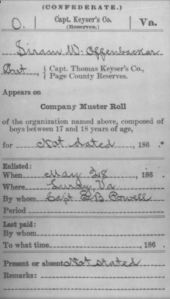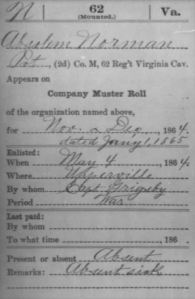Here were are again… on the eve of a major period of Sesqui events. Just to the east, there is the Overland Campaign… and closer to home, here in the Shenandoah Valley… there is Sigel’s advance up the Valley. Yet, to me, there are more than troop movements and battles, especially when May of 1864 in the Valley comes to my mind.
In fact, I remember when I was young, how excited I was to find out about two of my “boy” relatives who “enlisted” in a unit, on the verge of the battle at New Market clearly to “defend hearth and home.” But, did they really? I’ll get to that…
The unit in which these boys “enlisted” was Keyser’s Boy Company of Page County… an organization of boys between the ages of 17 and 18. The two boys… my gg grandfather and a third great grand uncle… especially stirred my thinking, as I wasn’t too far removed from the age they were at the time they “enlisted”. Over the years, however, I realized that their Confederate service may not be so simple.
Between the service records and the history of the time (specifically, the third Confederate Conscription Act), I came to understand that these boys probably didn’t just enlist at the first opportunity they had.
For starters, my gg grandfather, Siram W. Offenbacker, was a son of parents (his father was also a War of 1812 veteran) who were in their early 60s at the time of the war. Two of Siram’s siblings… both old enough to have enlisted earlier in the war… somehow remained (mostly) out. In 1861, Jacob F. Offenbacker (age 26) and Thomas M. Offenbacker (age 25) were both of prime age for military service. Indeed, more than likely because of their association with the prewar Virginia militia, they were both mustered into (2nd and 1st lieutenant, respectively) Confederate service, with Co. I, 97th Virginia Militia, on July 22, 1861 (I’ve explained in a previous post the mistake that some folks make in assuming that their ancestors in the militia were “volunteers”, and that it was more likely a case of being “activated”… the time after militia service often revealing more about true sympathies.) Yet neither appears to have had an interest in doing much more military service beyond the militia (if they even really “wanted” to be in the militia at the time they were mustered-in).
Just as an example, in August 1861, from the fair grounds at Winchester, both signed their names to a petition (signed by all of the officers of the 97th) directed to Governor John Letcher and President Jefferson Davis – a part of which follows:
We desire, first, to say that no portion of Virginia has been more loyal to the South and her interest than the militia of this valley; that we are among the first to send volunteers to the field of battle; that we have as great a number of volunteers in the field now in proportion to the strength of our militia as any portion of the State . . . We fully appreciate the condition of our country, and are willing to make any sacrifice necessary to advance the interest of the South and to secure our independence… The valley of Virginia is a wheat-growing country, in which slave labor is scarce; consequently the larger portion of the labor must be performed by white men between the ages of eighteen and forty-five years. The time for seeding the wheat crop has arrived, and unless at least a considerable portion of the men now here can be returned to their homes to attend to putting that crop in the ground we will be unable to raise supplies sufficient for our own subsistence.
Ultimately, they went home to take care of the crops, but were again called from their farms with the reactivation of the militia on November 4, 1861. Jacob does not appear to have returned, but Thomas shows-up on the rolls only through December 31. The more significant point in this is that, following the disbanding of the militia, in April 1862, neither of the two opted to enlist in the regular service. So, what exemption(s) were they granted to remain out of the war? Regretfully, I don’t have a clue, but even into the spring of 1864, they hadn’t been conscripted.
Younger brother Siram was a different story.
 Three months short of his 18th birthday, he was called into service in Thomas Keyser’s Boy Company. Service records show that he enlisted on May 28, but, in all probability, these records were compiled at some later point… and in error. In fact, Siram shows up on the rolls of 2nd Co. M, 62nd Virginia Infantry, as an enlistee, on May 4, 1864 (hence the motivation for this post, really… a day ahead of the 150th). I suspect this bungled record is partly the result of the quick calling-out of forces to confront Sigel’s Federal advance… that Keyser’s Company served as a pool of new recruits for the 62nd.
Three months short of his 18th birthday, he was called into service in Thomas Keyser’s Boy Company. Service records show that he enlisted on May 28, but, in all probability, these records were compiled at some later point… and in error. In fact, Siram shows up on the rolls of 2nd Co. M, 62nd Virginia Infantry, as an enlistee, on May 4, 1864 (hence the motivation for this post, really… a day ahead of the 150th). I suspect this bungled record is partly the result of the quick calling-out of forces to confront Sigel’s Federal advance… that Keyser’s Company served as a pool of new recruits for the 62nd.
Others caught-up in this whirlwind conscription effort, in May 1864, were my third great grandfather (Absolam Nauman) and one of his sons (Joseph Sirum Nauman). There is nothing whatsoever to prove my theory, but I think Joseph (age 17 and 7 months at the time he was entered onto the rolls of the 62nd Virginia) may have been in a similar situation seen with Siram Offenbacker, and that Joseph’s father, Absolam (43 years old at the time), was either conscripted outright, or joined along with his son in order to see that he was safe (pure speculation on my part).
Also, as in the case with the Offenbacker family, what was it, exactly, that kept Absolam from the ranks for three years? His postwar occupation as an iron miner might be enough of a clue as to how he was exempted up to that point. I feel obligated to throw in the fact that there were Unionists (some Naumans were even going as far as running an “underground railroad” for Confederate deserters) and Confederate-leaning folks in the Nauman family at the time, but that the actions of those others doesn’t help me in the least bit, in understanding the sympathies of Absalom Nauman.
So, in the end, were Siram Offenbacker and Joseph Nauman Confederates by choice? What about Absalom Nauman?
It’s hard to be sure, but there’s evidence to suggest that, maybe because of their youth, they may have been more willing than Absalom. Service records for Siram indicate that he was present through December 31, 1864. While unit records end at that point, I think there was something that I saw in his pension record that indicated he remained present with the unit until the end of the war. More importantly, especially regarding the “matter of choice”, in 1913, Siram was one of those Confederate veterans from Page County who wanted to attend the 50th anniversary events at Gettysburg (even though he wasn’t actually at the battle).

Card from Absalom Nauman’s service record. It’s not uncommon to see the family name listed incorrectly as “Norman”.
On the other hand, Absalom and son Joseph (he went by “Sirum”) Nauman were both listed as “absent sick” on the October and December, 1864 muster rolls for the 62nd Virginia. After New Market and Cold Harbor, was this an indication that they wanted to remain out of the war? Once again, purely speculative on my part, but I’m inclined to think Absalom would be satisfied to remain at home (he had a wife and five kids at home). Also, Absalom died in 1896 without (if this might actually suggest something) submitting an application for pension. Joseph, on the other hand, leaves an indication in postwar that he had no objections to his Confederate service, having both received a pension and being listed on the rolls of the local United Confederate Veterans Camp… for at least a year.


Neil Garrison
May 4, 2014
One of the Pro-Union Lewis family members of the Pt. Republic area (Rockingham County) was able to shield more than a few local males of the area from active Confederate service by employing them in his iron furnace. Perhaps this was the case with one of your ancestors in Page.